Is AI-Generated Content Good for SEO? The Pros and Cons
Sep 03, 2024
Written by Casey Bjorkdahl

Casey Bjorkdahl is one of the pioneering thought leaders in the SEO community. In 2010, Casey co-founded Vazoola after working for a Digital Marketing Agency for five years in New York City. Vazoola is now one of the fastest growing and most widely recognized SEO marketing firms in the country.
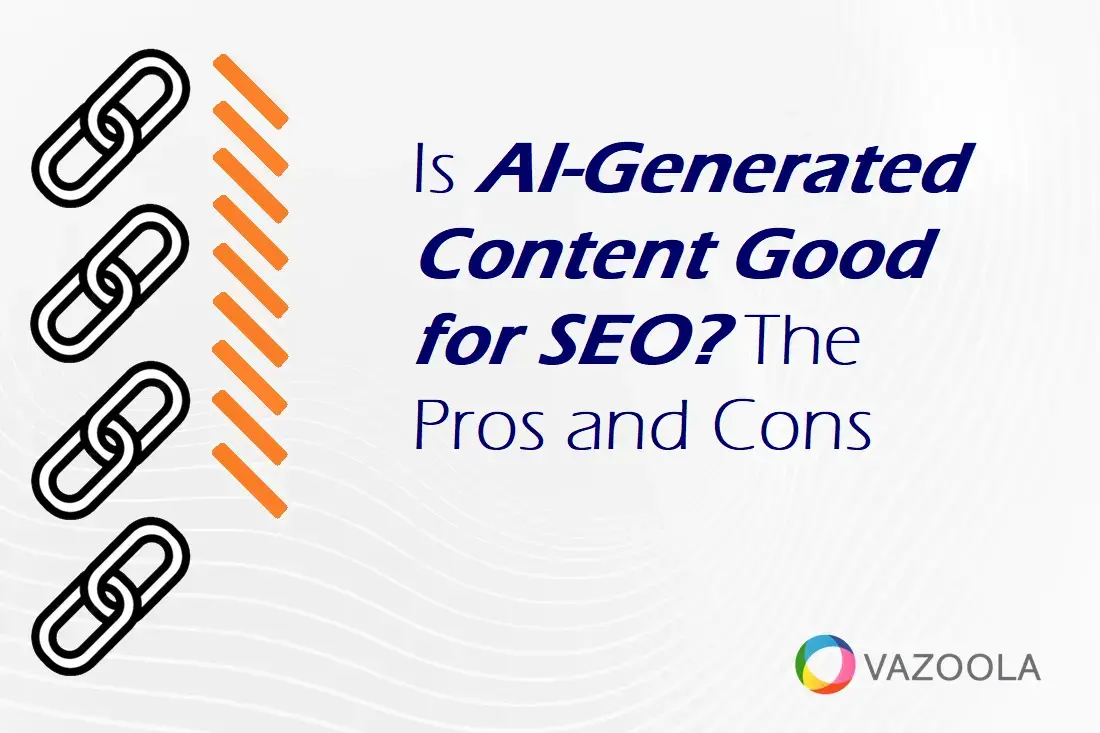
Artificial intelligence is here, and it’s transforming the way we work, including how we use AI to create content. How will AI-generated content impact your SEO strategy?
It’s true, AI is revolutionizing content creation, but is it the right choice for your website?
AI content certainly has both benefits and drawbacks, and Google's stance can be ambiguous. Fortunately, there are best practices for the ethical and effective use of artificial intelligence in content creation.
By the end of this article, you'll have a clear understanding of the ways AI can fit into your SEO strategy.
Key Takeaways:
-
AI-generated content has the potential to increase efficiency and productivity in content creation.
-
While there are advantages to AI, the technology also presents challenges like quality concerns and potential plagiarism.
-
Both understanding Google's stance on AI content and adhering to best practices are pivotal to successful implementation.
Table of Contents:
Understanding AI-Generated Content
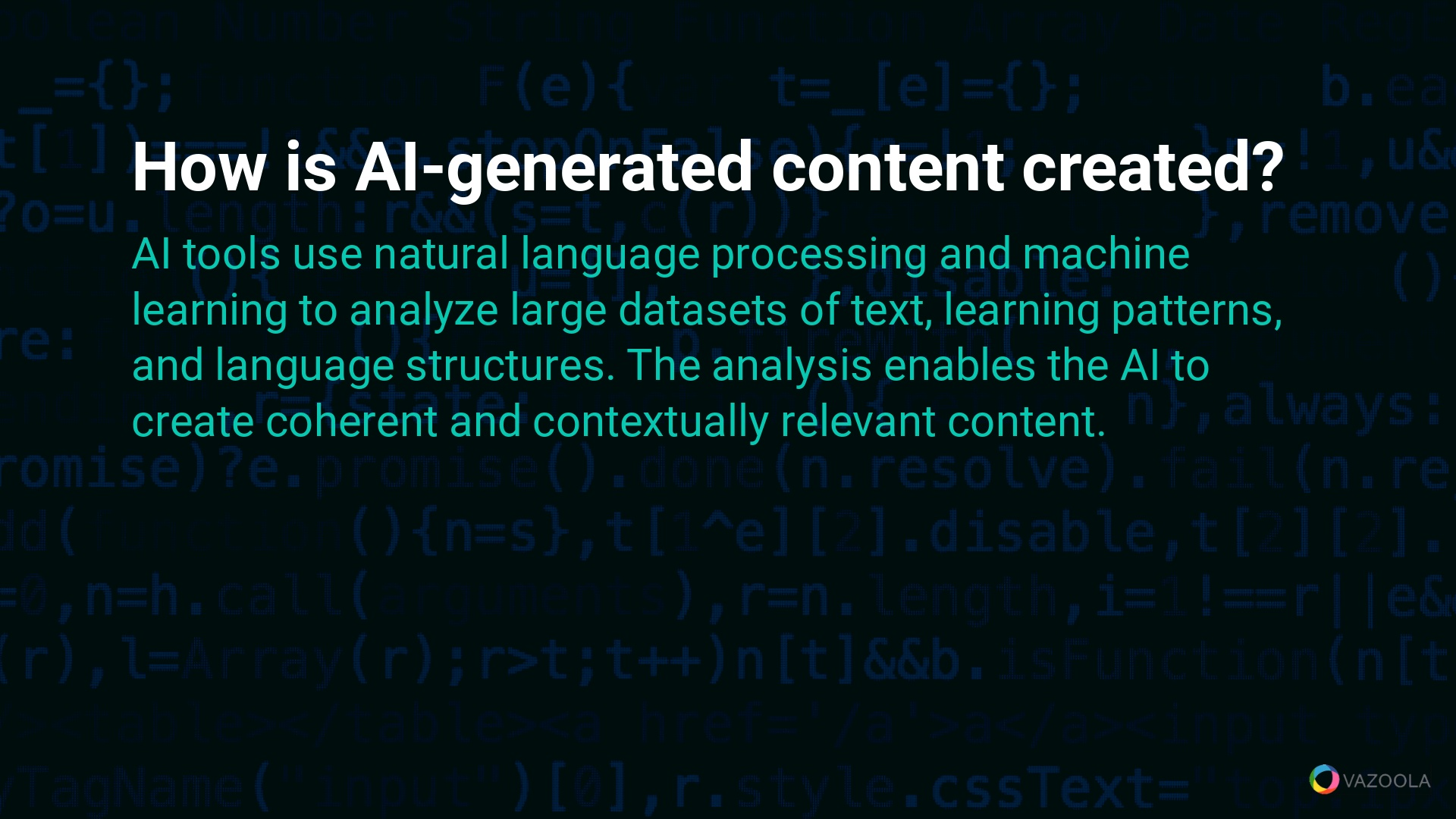
What is AI-generated content, and how is it created? Artificial intelligence algorithms produce text based on a set of inputs or prompts entered by the creator.
AI tools then can generate articles, blog posts, code, product descriptions, and other linkable assets by mimicking human writing styles and structures from its source data.
Popular AI content generation tools like ChatGPT and Jasper have gained traction for their ability to assist in content marketing.
But how do generative AI tools work?
AI tools use natural language processing and machine learning to analyze large datasets of text, learning patterns, and language structures. With that analysis, the AI can create coherent and contextually relevant content.
The generative aspect of AI refers to the technology’s ability to understand and respond to prompts.
Generative AI becomes conversational, between human users and technology, where you, the person, thinks of ChatGPT, Jasper or Bard as a virtual assistant, rather than a search engine.
So, instead of prompting it to write a 500-word essay on coffee beans, for example, and settling for the first draft, you send it back for rewrites with further prompts to add or remove sections, expand on certain ideas, or to incorporate certain keywords. This generative approach teaches the AI tool about your project and your needs as a publisher.
As the AI tools continue to advance, they turn even some of their greatest skeptics into believers.
Google's Stance on AI Content
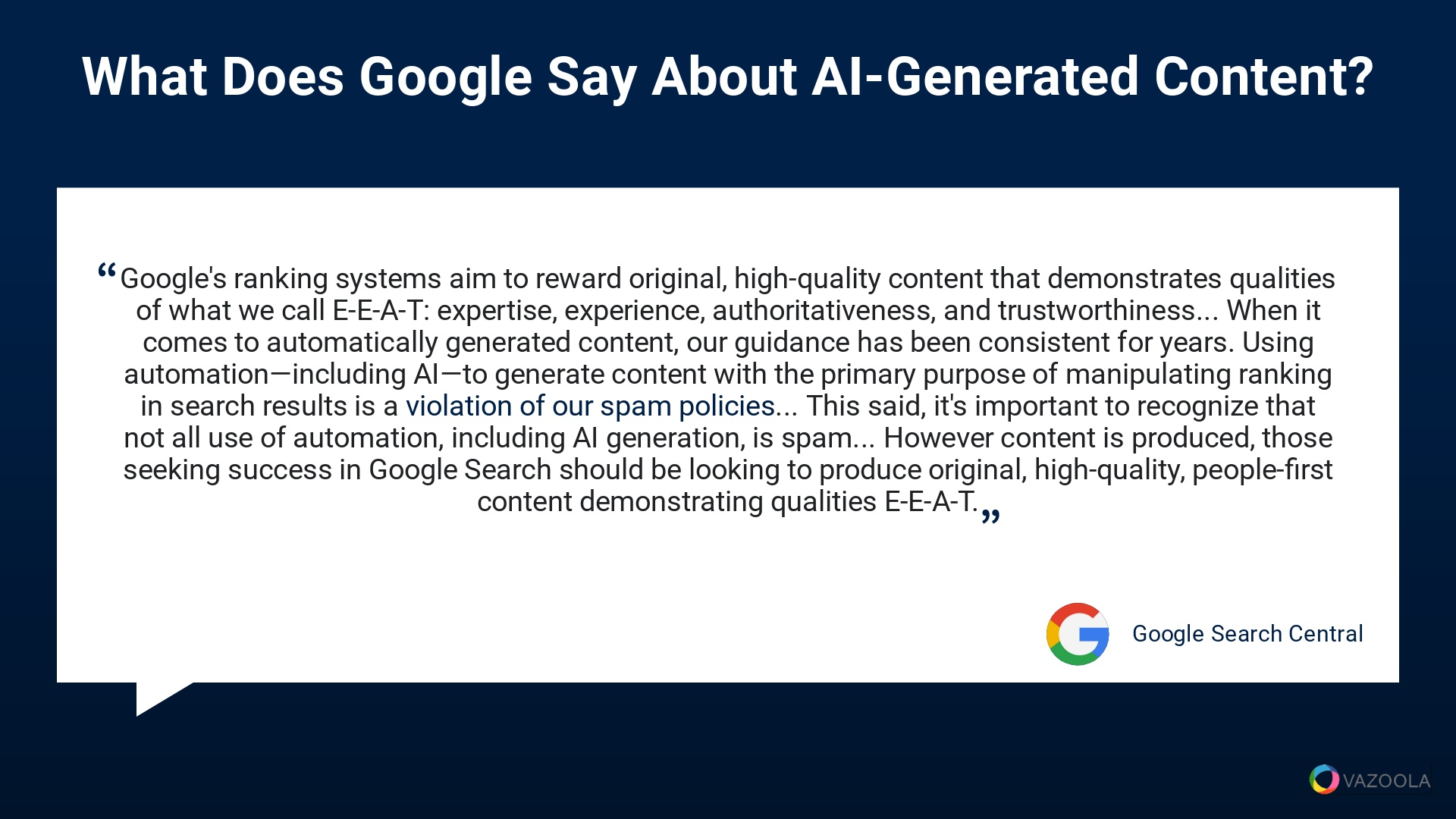
Does Google allow AI-generated content? What does Google have to say on the matter?
Much like its other rules, Google's guidelines on AI-generated content emphasize the importance of helpful, reliable, and people-first content – regardless how it was created.
Google's algorithms prioritize content that demonstrates experience, expertise, authoritativeness, and trustworthiness (E-E-A-T). To rank well, AI content also has to meet these standards.
So, no. Google doesn’t outright ban AI-generated content. However, the search giant warns against using it to manipulate search rankings.
If content lacks originality, if it’s of low quality, or if it violates Google's guidelines, Google might penalize it. To avoid this serious scenario, creators must use AI as a tool to enhance their content creation, not as something that replaces human oversight and creativity.
Pro Tips:
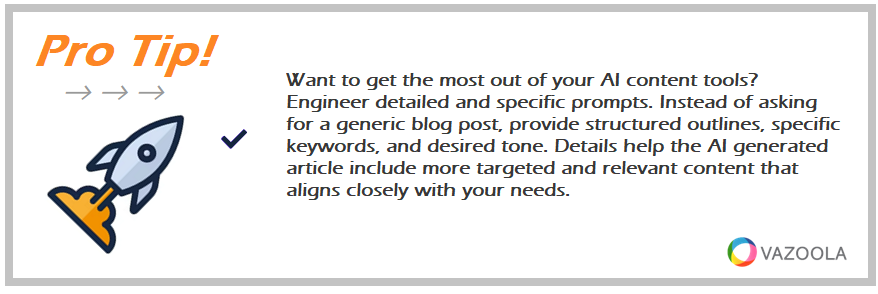
Want to get the most out of your AI content tools? Engineer detailed and specific prompts. Instead of asking for a generic blog post, provide structured outlines, specific keywords, and desired tone. Details help the AI generated article include more targeted and relevant content that aligns closely with your needs.
The Pros of Using Generative AI Content Creation SEO
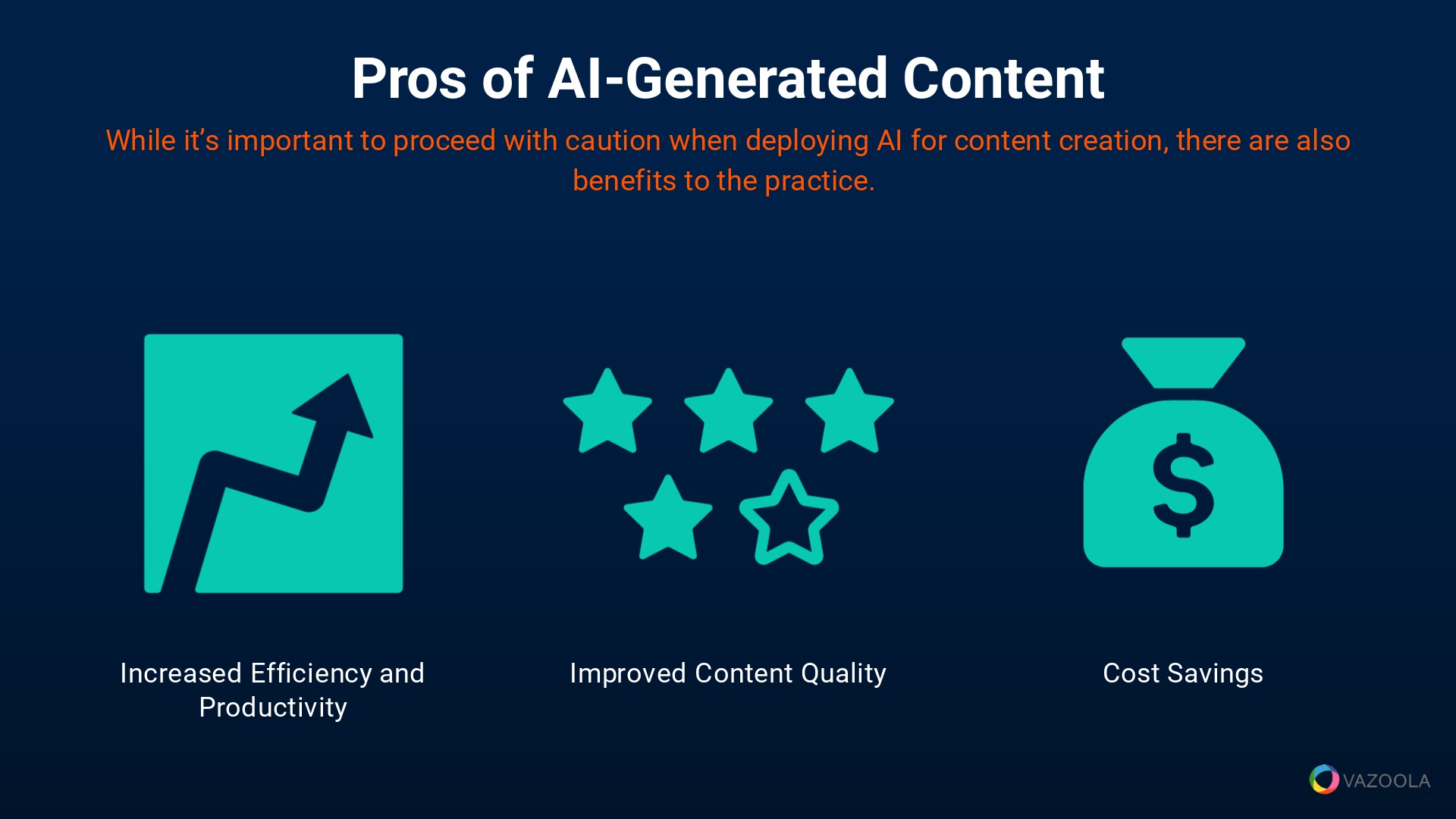
Are there benefits to publishing AI-generated content? Is it worth it to have AI creating content?
There are plenty of pro AI arguments, in fact. While it’s important to proceed with caution when deploying AI for content marketing, the practice does have some marked advantages.
From increased productivity to cost savings, more and more website operators and content creators are employing artificial intelligence in their SEO campaigns.
Increased Efficiency and Productivity
One of the main benefits of AI-generated content is the speed at which it can produce text.
AI tools can generate articles in minutes, while a human would need hours or more to create the same content. This amazing efficiency lets content marketers publish more frequently.
Rapid AI content creation can be particularly useful for businesses that need to maintain a consistent posting schedule.
AI can also help creators overcome writer's block by providing ideas and outlines, which reduces the time otherwise spent brainstorming. By generating initial drafts, AI frees up human writers to focus on refining and polishing the content.
As a result, the end product when created by ai and human can be superior to that generated by the human hand alone.
Businesses managing multiple websites or platforms can benefit from AI because it assists in scaling content production. It enables the creation of large volumes of content quickly – especially beneficial for e-commerce sites that need numerous product descriptions.
Improved Content Quality
AI tools also can enhance content quality by refining grammar, punctuation, and overall writing style. Think of it as spell check on steroids.
Further, AI tools can suggest relevant keywords, optimize headings, and improve content structure for better SEO performance. AI-assisted optimization makes sure content is both user-friendly and search engine optimized.
AI can also tailor content to a specific audience by analyzing user data and preferences. This type of personalization improves engagement and conversion rates, making content more effective.
Cost Savings
Does your business have a tight content marketing budget? Do you have to invest in SEO services, or are you taking the journey alone? AI-generated content can be a more affordable option than hiring human writers, especially for large-scale projects.
While AI tools require an initial investment, the long-term savings on content creation can be significant.
Pro Tips:
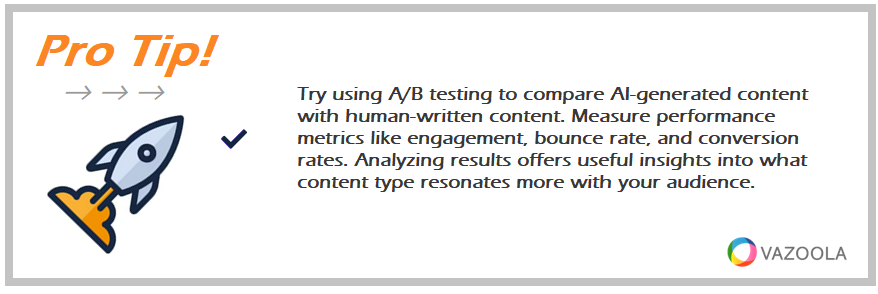
Try using A/B testing to compare AI-generated content with human-written content. Measure performance metrics like engagement, bounce rate, and conversion rates. Analyzing results offers useful insights into what content type resonates more with your audience.
The Cons of AI for Content Marketing
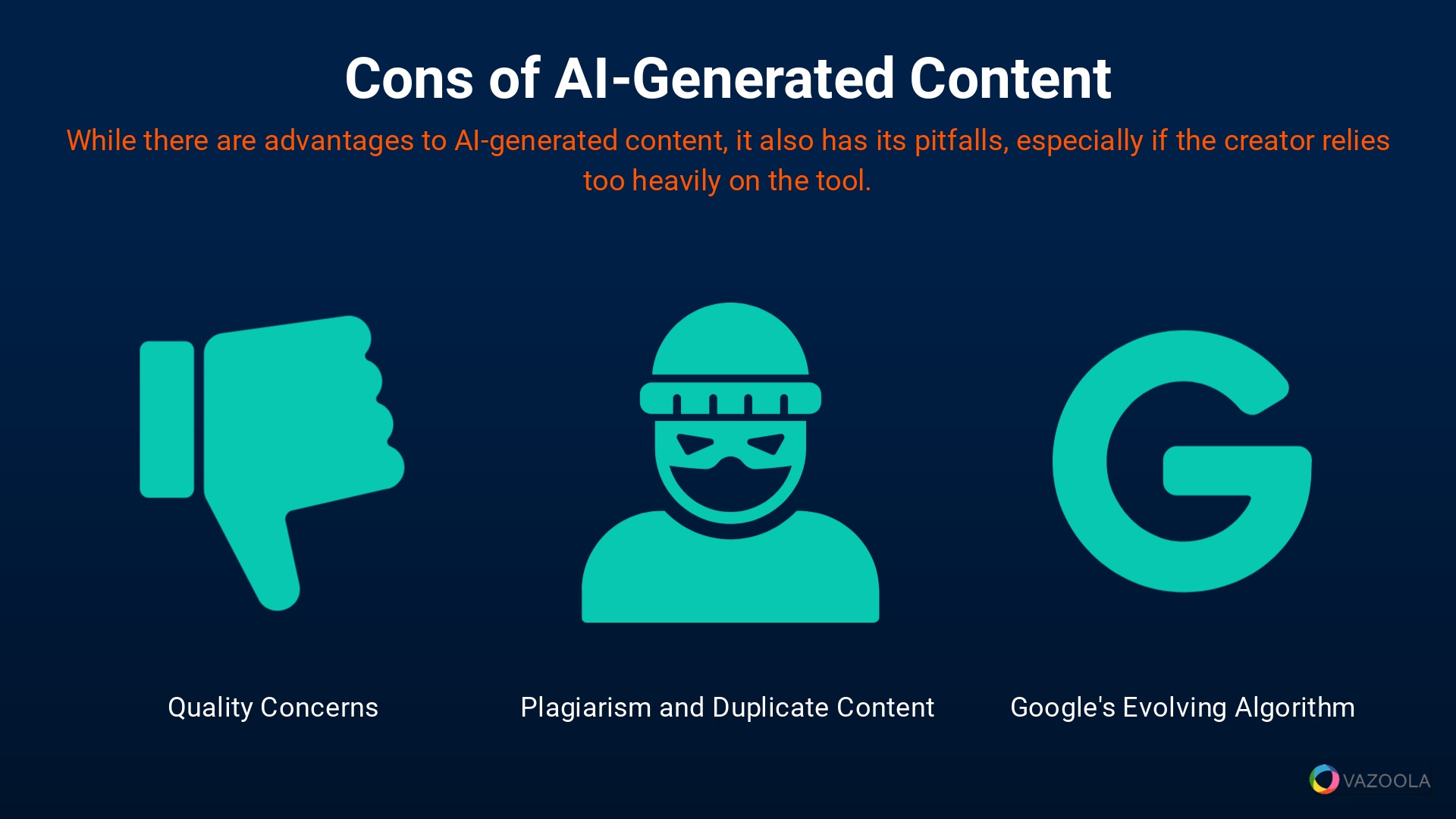
What are the downsides to AI for content marketing?
Now you know about the advantages of using AI-generated content. But the technology also has its pitfalls, especially if the creator relies too heavily on the tool.
Still, by remaining aware of the cons of AI-generated content for SEO, you can avoid issues like quality concerns and algorithmic changes.
Quality Concerns
Despite its many benefits, AI-generated content can sometimes lack originality. AI tools often rely on existing data, which can result in generic or repetitive content. Relying on AI-generated content also raises the risk of outdated information since the tool might be referencing old data.
A lack of originality can negatively impact SEO since search engines favor unique and high-quality content.
AI-generated content can also contain other factual inaccuracies. While AI tools are constantly improving, they can still make mistakes. That requires thorough editing and fact-checking by human editors.
Another challenge of relying too heavily on AI-generated content is the lack of emotional intelligence. AI struggles to create emotionally resonant or nuanced text. That lapse can affect the overall engagement and efficacy of the content.
Plagiarism and Duplicate Content
Any good content marketer knows to avoid plagiarism at all costs, but relying heavily on artificial intelligence can make them unknowingly guilty.
AI tools can inadvertently produce content that is too similar to existing work, raising the risk of plagiarism.
Duplicate content issues can also arise when multiple websites use the same AI-generated text. Regardless how the content is duplicated, it potentially can lead to SEO penalties.
Using plagiarism detection tools can help identify and address these issues. That way your content remains unique and compliant with Google's guidelines.
Google's Evolving Algorithm
As Google's algorithms continue to evolve, there is an ongoing risk that AI-generated content could be devalued if it fails to meet whatever new quality standards the platform sets.
Google's focus on E-E-A-T makes it challenging for AI to replicate the depth and authenticity of human expertise.
For continued success, content creators should stay informed about algorithm updates and adjust their strategies accordingly to maintain SEO performance.
Pro Tips:
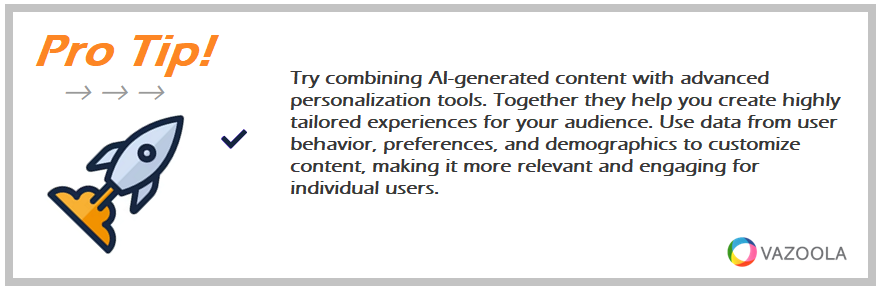
Try combining AI-generated content with advanced personalization tools. Together they help you create highly tailored experiences for your audience. Use data from user behavior, preferences, and demographics to customize content, making it more relevant and engaging for individual users.
Best Practices for Using AI-Generated Marketing Content
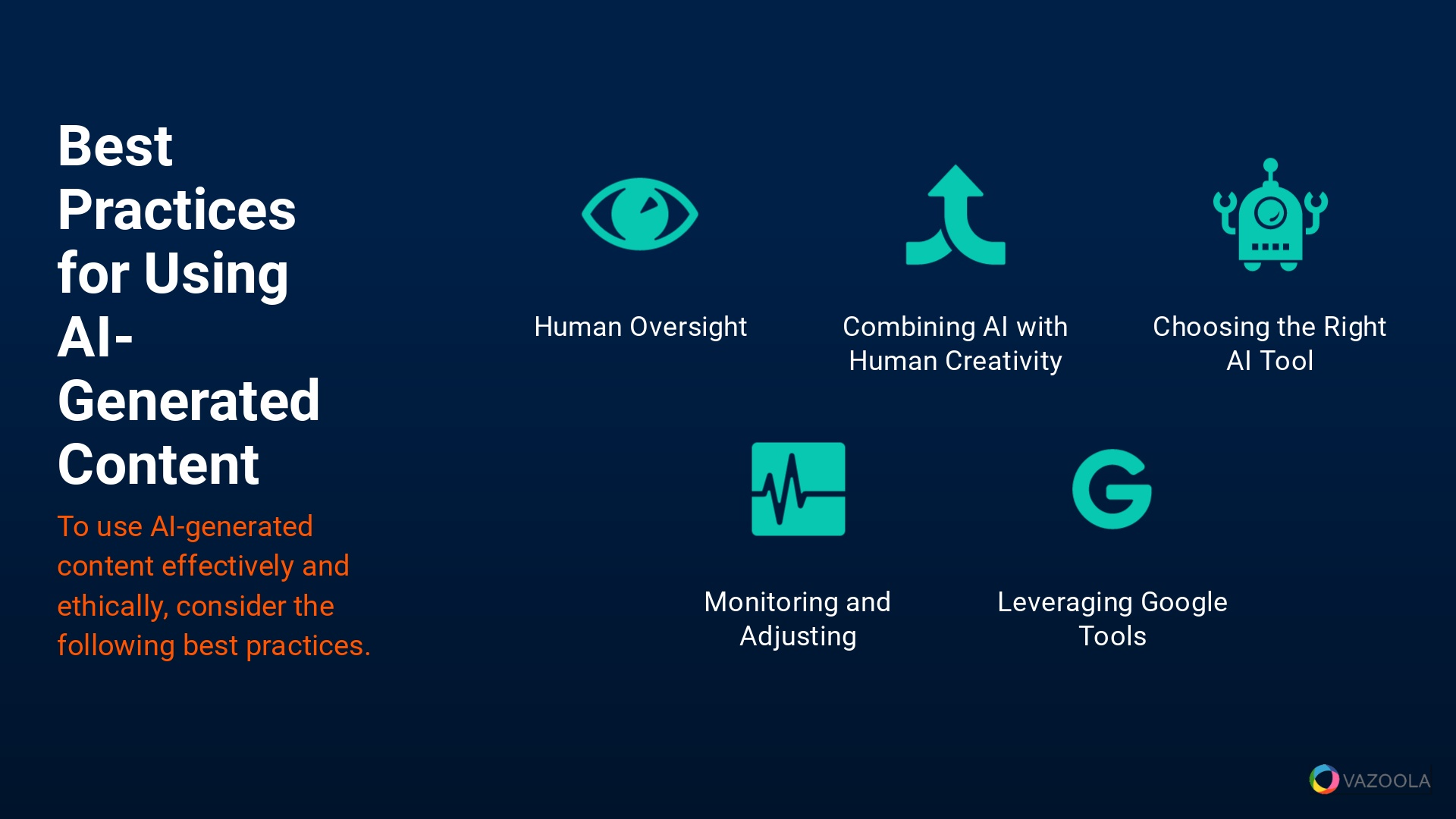
Concerned about how to use AI-generated content effectively and ethically? Consider employing the following best practices in your content marketing campaign.
Human Oversight
AI should complement human creativity, not replace it. Always have human editors review and refine any AI-generated content to ensure its accuracy, originality, and emotional resonance. Fact-checking and editing are a must to maintain content quality.
Combining AI with Human Creativity
Use AI as a tool to enhance – not replace – human creativity. AI can generate ideas, outlines, and initial drafts in an instant, while human writers add depth, insight, and a unique voice. A human/AI collaboration can produce high-quality content that meets SEO standards – and do so efficiently at that.
Choosing the Right AI Tool
Research and select AI tools specifically designed for SEO and content marketing. Look for tools that offer customization options, so you can tailor content to your specific needs and audience.
Monitoring and Adjusting
Just like you would monitor your human-generated content, you should use analytics tools to regularly track the performance of AI-generated content. Monitor key metrics like engagement, conversion rates, and search rankings. Use this data to make adjustments and optimize your content strategy.
Leveraging Additional Google Tools
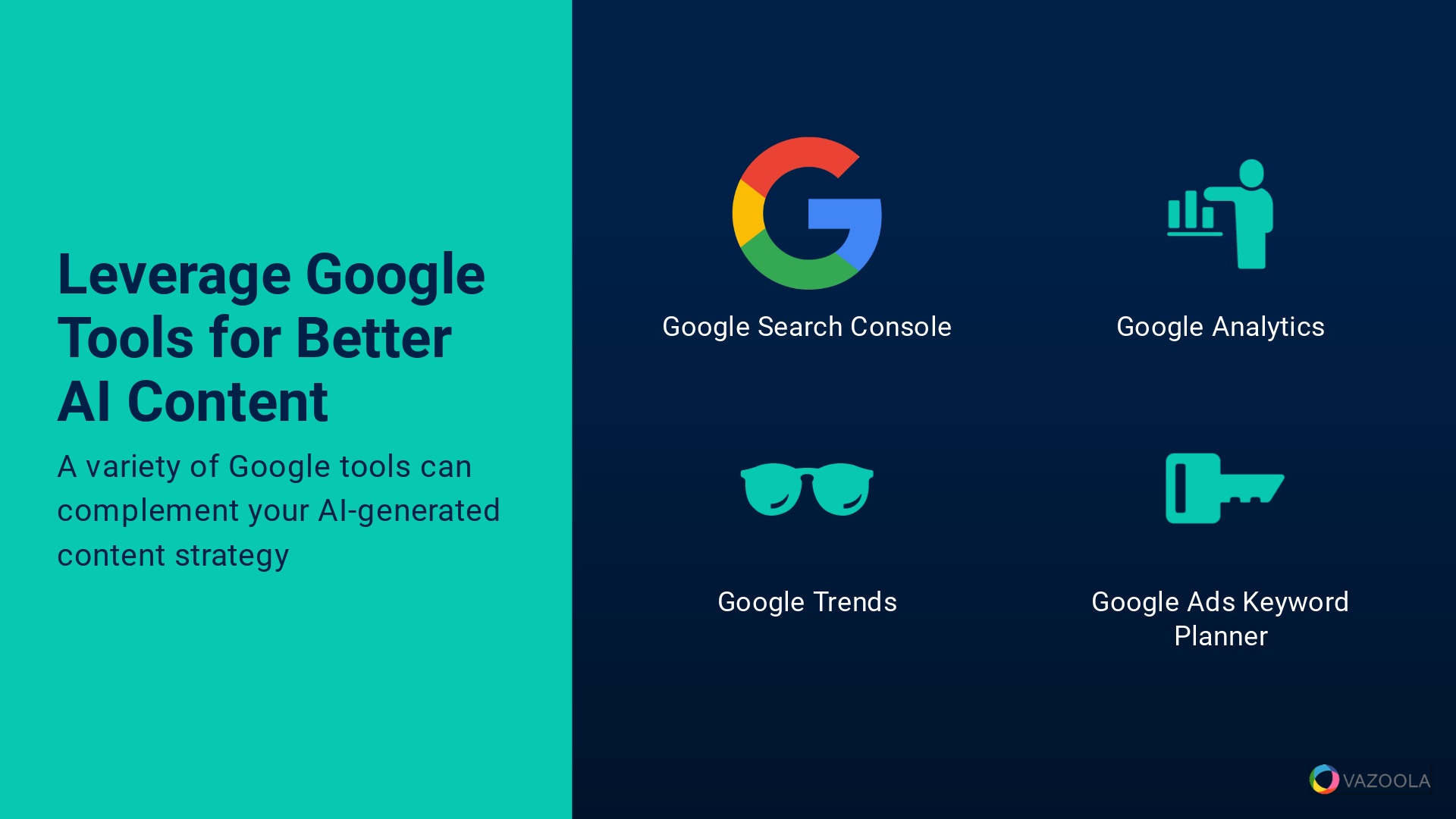
In addition to Google Search Console, other Google tools can complement your AI-generated content strategy, including:
-
Google Analytics: Google Analytics provides insights into user behavior and content performance. By analyzing metrics like bounce rate, time on page, and conversion rates, you can refine your content strategy and identify areas for improvement.
-
Google Trends: Google Trends helps you stay up-to-date on popular search queries and trending topics. Use the information to guide your artificial intelligence content creation. That way, you address relevant and timely subjects.
-
Google Ads Keyword Planner: The Google Ads Keyword Planner tool can help you in your keyword research. Doing so helps you identify high-performing keywords to incorporate into your AI-generated content. Optimizing your content with relevant keywords can improve your search engine rankings and visibility.
Pro Tips:
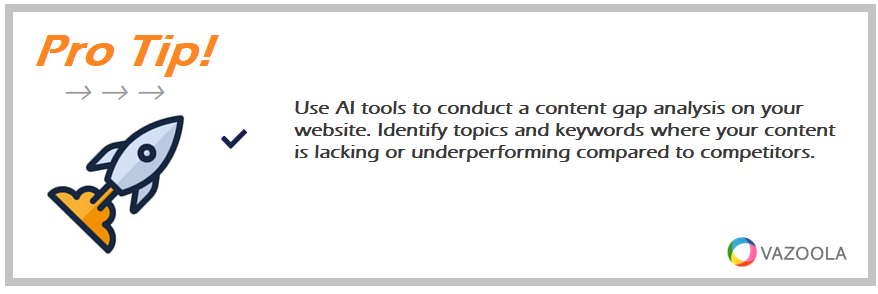
Use AI tools to conduct a content gap analysis on your website. Identify topics and keywords where your content is lacking or underperforming compared to competitors.
Explore the Pro and Cons of AI-Generated Website Content
AI-generated content offers a variety of benefits for SEO, including increased efficiency, improved content quality, and cost savings. However, it also presents challenges, including quality concerns, potential plagiarism, and the need to stay aligned with Google's evolving algorithms.
By understanding the pros and cons of AI-generated content and following best practices, you can leverage AI to enhance your content strategy effectively.
Remember to use AI as a tool to complement human creativity, so your content remains unique, accurate, and engaging.
For more insights and assistance with your SEO strategy, contact Vazoola for a free demo.
Pro Tips:
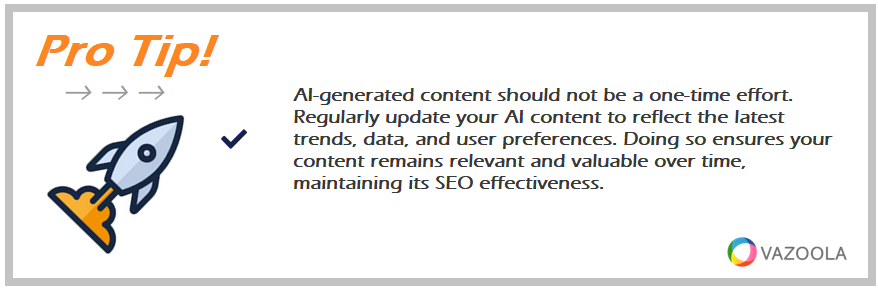
AI-generated content should not be a one-time effort. Regularly update your AI content to reflect the latest trends, data, and user preferences. Doing so ensures your content remains relevant and valuable over time, maintaining its SEO effectiveness.
